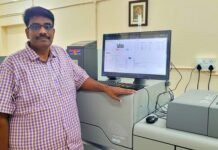The printing hub of Mathura is thriving, as is evident from the large number of orders that printers receive for printing school and college textbooks. Textbook printing in Mathura picked up in the late 90s – a time when most of the state governments started funding for the education of poor.
Sarva Shiksha Abhiyan (SSA), an Indian government program aimed at the universalization of elementary education for children between the ages 6 and 14 at no cost, gave further boost to the printing business in Mathura. The program enforced during Atal Bihari Vajpayee’s term as the prime minister of India in 2001 made education free and compulsory for children aged 6 to 14. The count of the number of children under the program was estimated to be somewhere near 205 million.
The program gave a much-needed push to printers across the country. Printers in Mathura were already working for a number of private publishers, and soon after the enforcement of the SSA, they started getting orders from state governments.
Various state governments got the textbooks printed through these printers by offering open tenders. Currently, Uttar Pradesh alone funds for a total of 2 crore children under the SSA scheme. The government provides nearly 15 crore textbooks for children being educated under SSA. Similarly, every other state funds for the education of the poor.
“Apart from the government textbooks, we get orders from NCERT for printing several books. We get a huge demand from a number of big states across the country. The highest is from the UP government. Similarly, we get a huge demand from Maharashtra, Bihar, Jharkhand and Madhya Pradesh,” says Gaurav Agrawal, proprietor of G-tech Print Works in Mathura.
Although G-tech began under the proprietorship of Agrawal, his family has been in the printing business for over two decades. Agrawal closely observed the business as he grew up and soon after completing his post-graduation, decided to set up his own printing unit.
Initially, printing in Mathura was confined to devotional books. Mathura being the birth place of Lord Krishna has been attracting a number of tourists over the years and is considered as a sacred city of Northern India, hence contributing to the demand for devotional books. Books printed in Mathura continue to be supplied all over the country. Slowly, with the advent of bigger printing facilities such as the Gitapress Gorakhpur, printers in Mathura started losing a big share of their work. Television played further role in demolishing a well-established printing business in Mathura.
Slowly, the printers turned to academic printing. A number of contracts started pouring in from private publishers for printing guide books and reference books. With changes in government policies, there was much focus on education and this led to a growth in demand for textbook printing in Mathura.
“Printing was confined to sheets during the early 90s. None of the printers in Mathura knew about the web technology though it was present. Web technology helps to print books comparatively faster. By the late 90s, the roll-to-sheet technology was successful only in single or two colors. In the year 1997, my father went for an exhibition in New Delhi. There he saw an Orient TPH 4-color press for the first time. He immediately realized that this machine would give a big boost to his textbook printing business. With the help of a few other partners, my father managed to install the machine. It was the first 4-color web offset press for printing textbooks in India at that time. It was basically a newspaper printing machine that he bought for printing textbooks. However, TPH made some changes to the press to enable textbook printing on it. There has been no looking back since then,” Agrawal adds.
Recently, G-tech installed two second-hand web offset machines that it purchased from Ahmedabad, Gujarat. “During my recent visit to Ahmedabad, I was surprised to learn that web technology was not known to them till 2011. They were all using sheetfed technology. With changing printing patterns, the printers had to change from sheetfed technology to web technology and it happened as late as 2011,” Agrawal shares.
The Indian paper industry is in a sweet spot. The rise in paper prices globally has provided an umbrella for raising domestic paper prices even as backward integration for wood/pulp locally through farm forestry has been successful. “The rising paper prices have affected every printer in the country lately. We’re in a helpless situation and can’t bear any further losses. Hence, I’m now printing all the textbooks without bearing the cost of the paper. The government purchases the paper and provides it to me in required quantities,” Agrawal says.
Currently, G-tech owns 4 web offset printing presses, 2 sheetfed printing presses and a complete postpress setup at its facility in Mathura. For prepress, the company makes the plates in-house but outsources any work that involves CtP. All the printing presses operating at G-tech’s units are from a Faridabad-based web offset machine manufacturer, Ideal Printographics Pvt. Ltd.
















